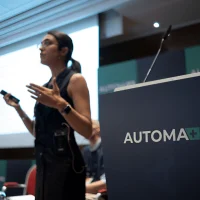Leading global innovator NTT DATA, and the wider NTT Group, has developed two new artificial intelligence (AI) solutions to help detect cognitive decline in elderly people. The first solution uses digital twin technology to build a virtual copy of the brain, before AI and machine learning (ML) is applied to analyse brain activity to spot and prevent dementia and mental illnesses such as depression. The second solution looks to use artificial intelligence to detect the cognitive ability of elderly drivers. The aim is to decrease the number of accidents while detecting and treating dementia at an early stage.
The Brain Bio-Digital Twin
According to the World Health Organization, there are currently 55 million people with dementia worldwide and nearly 10 million new cases emerge every year. With so many cases continuing to appear, NTT and the National Center for Neurology and Psychiatry (NCNP) have formed a partnership to find solutions to dementia and other mental health issues.
Together, NTT and NCNP are working on a new technology called the "Brain Bio-Digital Twin" which involves gathering huge amounts of data on brain-related diseases, converting it into digital data, then mapping it virtually as a digital model of the brain. With the data collected and digitised, AI and machine learning can then be used to study the brain and its functions. This project is an evolution of NTT’s work to create a "Bio-Digital Twin" of the entire body, not just the brain, which will give insights into a person's overall health.
The goal of the research programme is to create a digital version of a person’s brain that can be studied instead of the actual patient, with a prototype model planned for this year. This will lead to fewer invasive tests for patients, cheaper and simpler testing methods, better predictions of medication side effects, and earlier disease detection and prevention.
NCNP is a Tokyo-based organisation which offers treatments, as well as research on prevention and therapy, for patients with mental, nervous, muscular, and developmental disorders. It is contributing important data to the Brain Bio Digital Twin, including PET (Positron Emission Tomography) scans, and related bio-samples (blood, cerebrospinal fluid, tissue samples, genetic information), as well as supporting with medical interpretation of the results obtained through AI and ML processing.
NTT DATA’s work is also advancing research into combating dementia by using AI and deepfake technology to build digital avatars to communicate with dementia patients and stimulate them through dialogue..
AI to detect cognitive decline
NTT DATA is developing a new system that uses artificial intelligence to detect the cognitive ability of elderly drivers, and has already started work with Kokusai Motorcars on the project, which is scheduled to run until the end of June. Together they will analyse the driving behaviour of Kokusai Motorcars’ taxi drivers in order to develop the AI solution.
The AI system will analyse driving speed, acceleration and deceleration, and other driving data to assess whether drivers are seeing a decline in cognitive brain activity, such as the ability to make snap judgments and pay attention. The taxi company will collect a large amount of driving data from dozens of taxis whose drivers are 65 years old or older, which will be fed to NTT DATA so it can develop AI algorithms and verify the accuracy of driver judgments.
Data will be collected by attaching measurement devices equipped with global positioning systems, sensors and communication functions to the vehicles. It will then be sent to AI in the cloud to measure driving behaviours such as sudden braking and acceleration. This data will then be analysed in conjunction with the driver's original cognitive function status and age to determine whether the driver's cognitive abilities are normal or if they are in decline.
NTT DATA is aiming to launch the system as a cloud-based service within the next couple of years, with the service being targeted at the taxi and logistics industries in particular, where the average age of drivers is steadily increasing. The system will also be made available to general drivers in the future and NTT DATA is also considering building a specific version of this solution for insurance companies, so that it can be incorporated as a function of their insurance products.
Source & Image: NTT DATA







